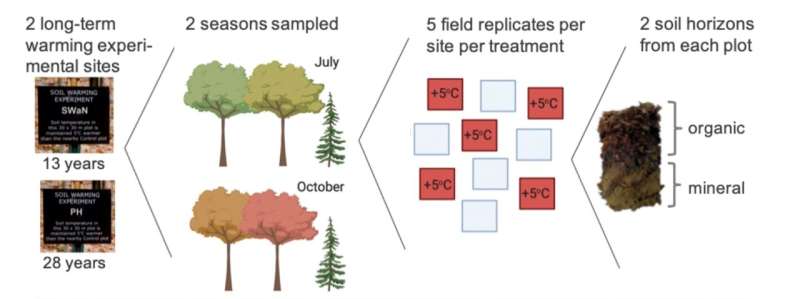This article has been reviewed according to Science X's editorial process and policies. Editors have highlighted the following attributes while ensuring the content's credibility:
fact-checked
peer-reviewed publication
trusted source
proofread
Our future climate depends partly on soil microbes—but how are they affected by climate change?

The largest terrestrial carbon sink on Earth is the planet's soil. One of the big fears is that a warming planet will liberate significant portions of the soil's carbon, turning it into carbon dioxide (CO2) gas, and so further accelerate the pace of planetary warming.
A key player in this story is the microbe, the predominant form of life on Earth, and which can either turn organic carbon—the fallen leaves, rotting tree stumps, dead roots and other organic matter—into soil, or release it into the atmosphere as CO2.
Now, an international team of researchers led by the University of Massachusetts Amherst has helped to untangle one of the knottiest questions involving soil microbes and climate change: what effect does a warming planet have on the microbes' carbon cycling?
The answer is surprising: increased temperature decreases the rate at which soil microbes respire CO2—but only in the summer. During the rest of the year, microbial activity remains largely historically consistent.
But there's a catch to this seemingly happy story.
Soil microbes are releasing less CO2 in the summer because they're starving. And they're starving because long-term warming is threatening the viability of deciduous trees, on whose dead leaves the microbes depend.
"One of the major outcomes of our study," says Kristen DeAngelis, professor of microbiology at the University of Massachusetts Amherst and senior author of the study, recently published in the journal Global Change Biology, "is that all those autumn leaves mitigate the negative effects of global warming on soil microbes." For now. But fewer dead leaves means less food for the microbes and seems to be leading to a reduction in microbial biomass during the summer.
To reach these conclusions, DeAngelis and her co-authors teamed up with two remarkable, long-term studies sited at the Harvard Forest: a project begun in 1991 by co-author Jerry Melillo on soil warming in forest ecosystems, and another, begun by co-author Serita Frey in 2006, focused on soil microbes and warming.
"Sampling soils that have been warmed for 13 and 28 years helped us elucidate how resilient to changes microorganisms are to shifts in temperature," says Luiz A. Domeignoz-Horta, the paper's lead author, who completed this research while at UMass Amherst and who is now a post-doctoral fellow in the Department of Evolutionary Biology and Environmental Studies at the University of Zurich.
Though much of the attention to climate change has been understandably focused on the burning of fossil fuels, it is equally important for scientists to understand the "carbon budget," or the complete cycle of how carbon cycles through the air, soil and water. "Once I woke up to climate change, I thought 'what can I as a microbiologist do,'" says DeAngelis. This newest research gives climate modelers a better understanding of how carbon works in the soil, which will allow us all to better plan for a warming world.
More information: Luiz A. Domeignoz‐Horta et al, Substrate availability and not thermal acclimation controls microbial temperature sensitivity response to long‐term warming, Global Change Biology (2022). DOI: 10.1111/gcb.16544
Journal information: Global Change Biology
Provided by University of Massachusetts Amherst



















